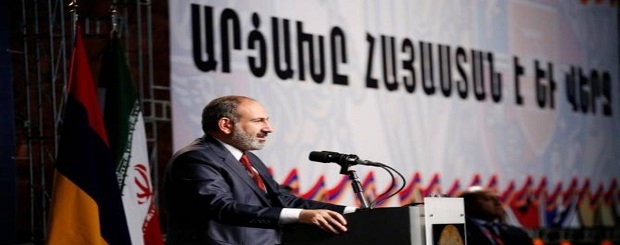
05.03.2019 | Hakob Badalyan, Commentator:
The spokesperson for the Iranian foreign ministry Bahram Qasemi, commenting on a poster reading “Artsakh is Armenia. Period.” held by the Armenian community in Tehran during the meeting with Prime Minister Pashinyan, said Iran does not welcome this.
Tehran’s stance on this is normal, Tehran could not ignore parity it has demonstrated for years on the issue of Artsakh. Moreover, this parity tells everything about Tehran’s position. Period.
In addition, the spokesperson for the Iranian MFA repeated that it is important for Iran to ensure that the issue of Artsakh does not affect bilateral relations with Armenia and Azerbaijan. In other words, official Tehran announces or reasserts that Iran builds its bilateral relations with Azerbaijan and Armenia and looks at it in a perspective based on the existing status quo.
This is a deep issue for Tehran and the statement of the Iranian foreign minister and what is between the lines are symptomatic against two things. First, Iran thereby sends a delicate response to the core statements of the Armenian prime minister during his official visit to the country, and alongside this official visit, in the south of Artsakh, at the Artsakh-Iranian border, the director of the Armenian National Security Service makes a statement on the defense of territories and their resettlement, namely the program of Araxavan. In this sense, Yerevan sent an impactful and important message to Tehran from the south of Artsakh alongside the visit of Nikol Pashinyan and the negotiations with the Iranian side, apparently strengthening the negotiation in Tehran and adding to its weight and substantiality. The status quo, the Armenian control on it, is extremely important for Iran. Of course, the core thing for Iran here is to rule out the presence of a third force here but in its turn this can rule out the reliable and effective Armenian control which also neutralizes the urgency and necessity of presence of other centers of power, the third forces in the Artsakh area altogether.
After all, the existing status quo took place upon the silent consent of Iran and the third forces, and the exceptional junction of this agreement is the sovereign Armenian control. In this sense, the visit and statements of the Armenian prime minister to Tehran, and at the same time the statement of the director of National Security of Armenia from the south of Iran were an important and convincing message to Iran and third centers. In this case, Iran is the most sensitive in several ways and the statement of the spokesperson of the foreign minister of this country prompts that Tehran has accepted the message. At the same time, the statement of Tehran is an answer to the “message” that Tehran received from the Russian prison, namely the extradition of the Talish leader Fahraddin Aboszoda detained in that country. This Russian-Azerbaijani step was a message to Tehran considering the historical and political Talish-Iranian links. Interestingly, this “message” came along with the high-level Armenian-Iranian meeting.
Another interesting circumstance is that the extradition of the Talish leader took place along with the visit of the prime minister of Israel to Moscow. Iran actually responded to the Russian-Azerbaijan or maybe the Russia-Israel-Azerbaijan step with a statement that the issue of Artsakh should not affect Iran’s relations with Armenia and Azerbaijan, in other words, Iran builds these bilateral relations based on the existing regional status quo.
www.lragir.am/en/2019/03/05/71215
